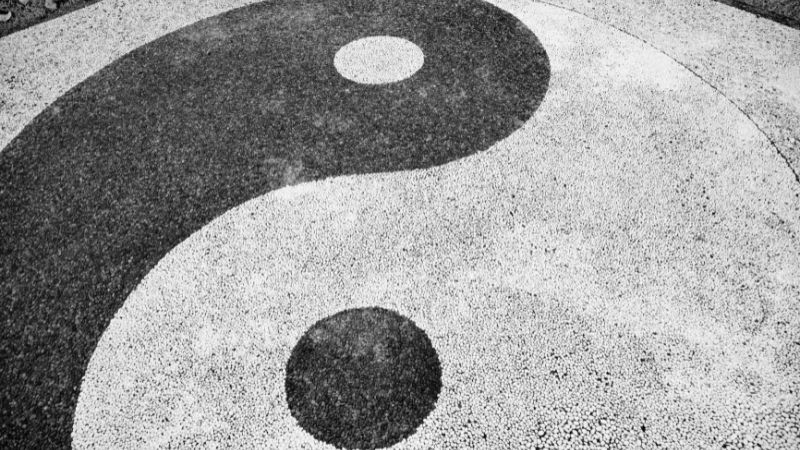READ TIME: 12m
DR JOHN DEMARTINI - Updated 3 years ago
Like many people, you may catch yourself thinking, “I wish I had done this”, “I shouldn't have done that”, or “I really messed up here”. You may even believe that you’ve somehow self-sabotaged or limited yourself, and carry feelings of regret as a result.
I'm a firm believer that anything you can't say thank you for is baggage, and anything you can say thank you for is fuel.
Whenever you feel regret, ashamed or guilty about something you've done, it likely means that you have expected yourself to do something different from what you did.
You likely also assumed that whatever you did had more drawbacks than benefits either to yourself or another individual.
Let me begin by saying that having run my signature two-day program, the Breakthrough Experience, over 1,160 times around the world and online, I have yet to see an event or circumstance that has only one side.
Every event has two sides.
In fact, everything that's ever happened in your life has simultaneously both an upside and a downside.
Should you focus on the downside and not look for an upside, you’ll likely feel regret or resentful.
It is wiser to bring your conscious awareness into full awareness where you can simultaneously see both the up and down sides.
Human beings have at times a basic survival state associated with what is called a subjective bias - an assumption of life being more one sided that results in seeing a negative without a positive or a positive without a negative.
A false positive is when you see something that's NOT there, and a false negative is when you don’t see something that IS there.
When you don’t live congruently with what you value most, by your highest priority, your blood, glucose and oxygen flow into the subcortical region of your brain including your amygdala.
Imbalanced perceptions that activate the amygdala give rise to subjective bias and misinterpretation, which is often the source of many of your regrets and resentments in life.
Once you balance your perceptions, you are able to dissolve the regrets. Note, not “live with” or “come to terms with” your regrets, but DISSOLVE your regrets.
I'm a firm believer that whatever you've done in life is ultimately “on the way”, and not “in the way”, unless you choose to see it as being “in the way.” That's your own perception.
You have control of your perceptions, decisions and actions in life.
If you choose to perceive an event as a nightmare, it can stay a nightmare. However, if you go and find out how whatever you've done or that you perceive has been done to you has served others or yourself equally, you become liberated.
In the Breakthrough Experience, I teach something called the Demartini Method, a scientific process that helps you balance your perceptions and dissolve emotions such as rage, guilt, shame, anger, and regret.
One of the applications of this method involves going to a moment where and when you perceive yourself displaying or demonstrating some specific behavior, (trait, action, or inaction) that you dislike in yourself or some other that you perceived has caused pain, loss, regret, or resentment to somebody else or to you.

In other words, you take the time to itemize exactly who you perceive was supposedly affected by it.
The next step may surprise you, because it involves asking the question: How did it SERVE them or me?
Should you choose to never look for the upside, you'll likely live with unnecessary regret in your life.
I often encourage people not to give up too easily when asking themselves this question, because it may seem foreign and challenging if you have become accustomed to projecting or playing the victim in your life.
It is wise to hold yourself accountable to balancing out the equation so that you are able to govern and balance your perceptions so you can become neutral and objective instead of reactive and subjective.
When you’re perceiving an event or situation as being one-sided, you tend to see more drawbacks than benefits.
By not seeing the upsides, you unnecessarily trap others or yourself in self-judgment and self-depreciation because you never asked the question: What were the upsides? What were the benefits? How did this serve me or them?
As you become conscious of the benefits, you’re most likely to experience your levels of resentment or regret going down.
A question I am often asked is: what if some action you did was perceived to have affected someone else and that you perceive has caused them more pain than pleasure, more loss than gain, more negatives than positives, and more disadvantages than advantages?
In these instances, my reply is to take the time to stop and look because there is no event that has one side. There’s no event that doesn't have upsides to what you may currently perceive are only downsides.
The same practice I outlined above can be used – looking for the upsides.
I have seen hundreds of examples where people have dissolved and balanced their perceptions of what we may perceive as being unthinkable events.
One that comes to mind is a gentleman who was ransomed for a huge sum of money, something that caused a great deal of stress and emotion both for him and his family. He had been labeled as having
post-traumatic stress disorder and found it incredibly challenging to live each day with the anger, bitterness and resentment he felt were consuming him.
So I asked him, “What was the benefit to what happened to you?” He was slightly taken aback and quickly responded that there was absolutely no benefit whatsoever, and asked how I could even think there could be a benefit to what he and his family had been through.
My response, again, appeared to surprise him. I replied that when you have an absolute, moral, hypocritical view about life that's only black and white without any gray, you tend to not be adaptable or resilient.
Resilience has a lot to do with the ability to see both sides of a situation.

I asked him to hold himself accountable to looking for the benefits. After a while, he responded that he had been spending far more time with his family since the event.
He carried on thinking for a while before telling me that another benefit was that he had restructured and prioritized his work life so he could delegate more and spend more time doing what he loved before heading home at a more reasonable hour than before.
He then added that his wife had felt inspired to go after what she truly wanted in life because she had realized how quickly life can change.
After continuing the process and stacking up even more benefits, he realized that the thing he had perceived as being so terrible, wasn’t so terrible after all.
We were able to dissolve his resentment towards what had happened, the guilt and shame he carried as a result of his perception that he should have protected his family more, and the many emotions that had been weighing him down.
I am certain that there's no reason for you to carry unnecessary emotions. Emotions are simply incomplete awarenesses.
Most people assume that they need to recover from and learn to live with the repercussions of a traumatic event. I challenge that model and believe it to be antiquated. I think there's an event that occurred that you have consciously or unconsciously CHOSEN to perceive as being traumatic.
It's not the event, it's your perception of it.
Great philosophers have been saying it for centuries, but many people prefer to run a story about how they are victim. As a result, they often create a false attribution bias about what other people “did to them” or what they “did to other people”. They seem to be more comfortable in a moral hypocritical world of one-sidedness instead of a world where, like a magnet, both sides exist.
For example, if you expect yourself to always be nice, never mean; kind, never cruel; generous never stingy; always giving, never taking – in other words, to always only be one side, you have created a complete moral fantasy and an unrealistic expectation on yourself. Anytime you don't match up to those unrealistic expectations, you’re likely to experience regret and shame, and feel that you’re letting yourself or others down.
Realistic expectations combined with asking quality questions can dissolve regret.
I’ll never forget a man coming to the Breakthrough Experience and arriving in what can only be described as a catatonic state. I soon learned that he had been named and shamed for a massive explosion at the Phillips 66 refinery in Pasadena, Texas and Deer Park Pasadena area that had killed over 23 people.
In brief, he was responsible for a part called the valve o-ring, and when it leaked, dehydrated and oxidized, the explosion resulted. At that time, very little could have been done to prevent it, but the company needed a scapegoat and he was it.
He just couldn’t handle the international publicity together with the fact that he blamed himself, which resulted in his catatonic state that no psychiatrist or medical professional had been able to break through.
When the time was right and while everyone was working their way through an individual process, I knelt down in front of him and tried to make eye contact with him. It was as if I wasn’t even there.
So, I began listing all the benefits and subsequent technological developments that had taken place with the o-ring, as a result of the explosion.
Industry’s pursuit of safe process design and operation started long before the explosion on October 23, 1989. However, PSM 30 yr ago was much different from what it is today. For example, in 1989 there were no process safety engineers staffing roles in industrial divisions. Neither were any process safety coordinators directing site compliance activities according to PSM principles. In fact, OSHA’s PSM standard that revolutionized the uniform application of safe process design and operating practices in the U.S. was not published into the Code of Federal Regulations (29 CFR 1910.119) until almost 3 yr later. Significant progress resulting from these developments has certainly made industry safer. Through these advancements, countless catastrophic process releases have been prevented, and many lives saved.

I told him about new systems that had been put into place, enforced periodic replacements of the o-ring to ensure they didn’t become oxidized, and the many upgrades to safety protocols and procedures that had been implemented.
I told him how, if it wasn't for that event, further lives would have been lost on an even greater scale, and that the overall death rate from injuries and explosions had since dropped, so while, lives had indeed been lost, lives had also been saved as a result.
I continued listing even more benefits until we got to 79 in total, and then I got the whole group involved to stack up as many benefits as we could come up with. The more we wrote down, the more he cried. He finally had some relief from the weight of the shame, self-blame and regret he had been carrying since the accident. I later learned that he had returned to work within weeks of his time at the Breakthrough Experience.
Every event is neutral until somebody with a subjective bias labels it as being good or bad.
As John Milton said, you can make a heaven out of a hell or a hell out of a heaven. It's all about perception. I've been teaching people this process for nearly four decades, helping them take and cognitively reappraise their perceptions.
I have yet to find anything they thought was terrible that we couldn’t find the terrific in, or anything they thought was terrific that we couldn’t find the terrible in. In fact, each event is neither untill someone with a narrow view or mind makes it so.
Bronnie Ware, an Australian book author of a beautiful book on The Top Five Regrets of Dying, wrote about the most frequent regrets people speak about at the end of their life. These include having the courage to be more true to themselves, not working so hard, expressing their feelings more, staying in touch with their friends, and giving themselves permission to be fulfilled.
I believe that regrets are unnecessary. If you ask the right questions, because the quality of your life is based on the quality of the questions you ask, become conscious of upsides of which you may have been unconscious, and stack up the benefits, you can dissolve your regret and bring balance to your perceptions.
Regrets are simply imbalanced perspectives, and as I mentioned before, you have full control over your perceptions if you ask quality questions to help you balance them.
To sum up:
- You don't have to wait weeks, months, or years to dissolve your regret, shame and other emotions that are weighing you down. I've watched people who have been beating themselves up and regretting things for decades clear it in minutes during the Breakthrough Experience.
- I am certain that there is no reason to carry around shame, guilt and regret in your life.
- It's simply a choice of perception, decisions and actions you take, and the quality of the questions you ask.
- Let me show you how to ask questions to liberate yourself so that you’re freed from carrying around unnecessary emotions. I'm certain they can be dissolved and it's so simple, it's almost mind-blowingly simple.
- If you would love to dissolve any regrets, shame or self-blame that you have in your life, come to the Breakthrough Experience. This is where I can help you transform it. I can show you the exact steps to follow in any situation for the rest of your life.
- It’s a tool that can transform your life so you can learn to dissolve infatuation, resentments, philias and phobias, prides and shames, and regrets and other emotions that may be keeping you from being grateful, inspired, enthused, certain and present in your life.
Are you ready for the NEXT STEP?
If you’re seriously committed to your own growth, if you’re ready to make a change now and you’d love some help doing so, then click on the LIVE chat button bottom right of your screen and chat to us now.
Alternatively, you can book a FREE Discovery call with a member of the Demartini Team.
Interested in the Breakthrough Experience seminar?
If you’re ready to go inwards and do the work that will clear your blockages, clarify your vision and balance your mind, then you’ve found the perfect place to start with Dr Demartini at the Breakthrough Experience.
In 2 days you’ll learn how to solve any issue you are facing and reset the course of your life for greater achievement and fulfillment.
Click HERE to find out more
Important Notice:
The content shared in this blog is for education and personal development. It is not intended to diagnose, treat, cure, or prevent any psychological or medical conditions. The information and processes shared are for general educational purposes only and should not be considered a substitute for professional mental-health or medical advice. If you are experiencing acute distress or ongoing clinical concerns, please consult a licensed health-care provider.
Read full disclaimer HERE









